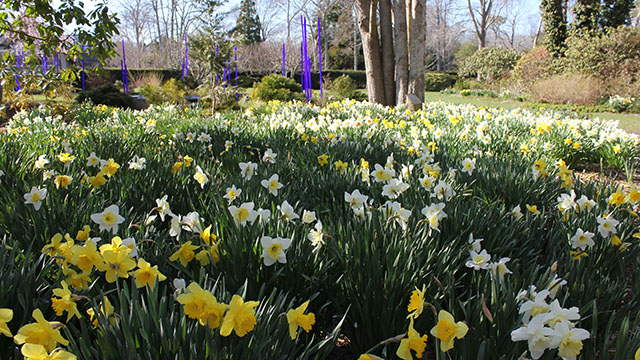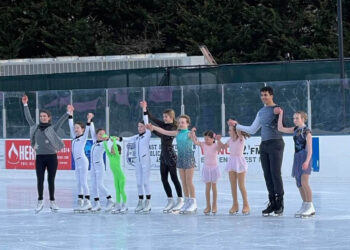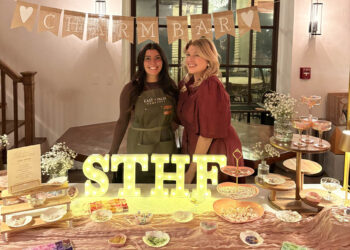Not only will the LongHouse Reserve’s Rites of Spring on Saturday, April 28 serve as the official season opener for the spectacular 16 acre reserve and sculpture garden in East Hampton, but the event will also feature a very special dedication of LongHouse’s amphitheater to playwright Edward Albee.
We caught up with Academy Award winning actress Mercedes Ruehl, who starred in many of Albee’s works, about the remarkable playwright, the allure of LongHouse, her role in Broadway’s Torched Song, and more.
You’re performing during Rites of Spring, which will include the dedication of LongHouse’s amphitheater to playwright Edward Albee. What can attendees expect?
MR: If the weather’s warm enough, it’s going to take place in the outdoor amphitheater, which is this beautiful horseshoe shaped natural, grassy, knoll amphitheater and they’re dedicating it to Edward – who’s done a lot of performances and readings there over the years. Everybody will mill around a bit and then organize there unless it’s so cold or rainy or windy in which case we’ll go inside. Jack Larsen will speak and Jane Alexander, who’s a friend and has worked on Edward’s plays is going to speak. Harris Yulin and I are reading the first scene of Who’s Afraid of Virginia Woolf.
What does it mean to you to be included in the ceremony?
MR: I was in a number of his plays – starting with Who’s Afraid of Virginia Woolf with Patrick Stewart at The Guthrie, and then The Goat and Occupant – the play he wrote about Louise Nevelson. He had a house out in Montauk, a beautiful house on the cliff – but over the years we became friends. He was a wonderfully loyal friend; in so far as he came to just about everything I did – whether it was out here or in the City. He was notoriously gruff at times, but he had an opposite side that was tremendously tender. For instance, my dad was living out here on the East End with us [my family] when we were doing The Goat and he died shortly after I left The Goat. Edward was the first person to call me when he saw the obituary in the East Hampton Star, the very first person. So he could be very kind in that way, and many ways. He was loyal to his friends, he was loyal to actors. If he liked you, he used you again and again, and supported you in whatever he did. He was the same with artists, painters – he was a great collector of art. If he liked an artist, he went out of his way to support them and their work. He means a lot to me on a number of levels. I really loved him.
What about his work resonated with you?
MR: Obviously the language. He had a way of using language that was different than anyone else. It’s funny, I teach acting at the HB Studios and one of my students sent me a clip of Marlon Brando talking about acting just last week. Marlon Brando said something that I had always thought to myself about acting. He said, “Find a way to do it that’s different than anybody else’s way – of even thinking about doing it.” And he’s talking about a role. Edward found a way of writing about this mysterious business of being alive in a way that nobody else ever thought about doing, in a style that no one had ever brought to the table before. He was very expansive and conscious of language. He used it in a way that was utterly unique, his style was utterly unique. He loved language and loved what language could do. Often, it could be very direct as in Virginia Woolf and shocking, but in the same play as in say A Delicate Balance, there were lyrical passages too. I remember when I was in college studying him, I majored in English and this was a course in Modern American Drama, and reading a lot of his plays and plucking some of his phrases like from Virginia Woolf: “the regulated great grey life.” I used to throw that one around a lot. He had fun with language. There’s a beautiful speech of Agnes’ at the very end of A Delicate Balance where he talks about how you just kind of wait and put it off, the great challenges of life. “You wait,” he says, “and time happens and then when you finally do go, sword, shield, finally, there’s nothing there but dust and bones in the wind.” There was that kind of beauty to it. There was great lyricism at times in his plays.
Did he ever give you any advice that stuck with you throughout your career?
MR: He was not an advice giver. He would attend rehearsals for his plays that were premieres for his plays and he would say very little and rarely changed a line, rarely. That was very different from other playwrights that I had worked with. But occasionally he would just give you a little nudge. At one point, Larry Bryggman – who was doing Occupant with me and I was playing Louise Nevelson – towards the end of the play in one of the run-throughs, at the very end, he came over and embraced me. Edward said, “No. No No. No. No.” He didn’t like sentimentality at all. His favorite expression when he loved a piece of work – whether it was an art piece or piece of acting – his highest praise was: tough, it’s tough. He wanted Nevelson to be “tough.” So he was absolutely against any sentimentalizing at all. He came to the dress rehearsal, it was the only one he could make when I did Virginia Woolf with Patrick Stewart. I was terrified and he came backstage afterward and he was exceptionally kind. I opened the door and there he was at my dressing room. I wasn’t expecting him to come back and see me alone. He just put his arms out and I went into a hug. It was a real hug and he sat and we talked and he was extremely gentle with me. At the end, when he was leaving, he said, “That was good. Just remember, she loves her father very much.” I thought, okay… not exactly sure how that’s going to work out but I’ll put it in the hopper to meditate on. So he was very short and succinct when he gave a note.
I would say in The Goat, the only big problem we had was in the last moment when I bring on the dead goat after I killed it. We thought that it was almost a Greek moment in the rehearsal hall, everybody treated it with great reverence, but the first audience that saw it, at the first dress rehearsal preview, laughed their heads off. We didn’t know what to do because there was this big dead bloody goat that I was bringing in on my arms, staggering under it because it was heavy. We had this line, I gave it to Bill Pullman who was playing my husband. I went all the way down the stage to hand it to him, and I said, “Here.” And the audience started laughing even more. I then I said the next line, which was: “You were right about her eyes.” And they laughed some more. And then I said, “She had such beautiful eyes.” They fell out of their seats. So, afterwards, the director and Bill and Liz McCann, the producer, and Edward sat around and said how do we get this ending back where it belongs? It took us awhile to figure out how to get this goat on. It was one of two times I got testy with Edward and he got testy right back. But, the interesting thing is, when he got testy it would hit the airwaves and you realized you just both annoyed each other a little bit, but he would end it immediately with a little joke or some little kind thing so it just came and went. Because I was the one bringing it on and being laughed at, I didn’t want to keep going through it that way. The director said, “I think we should try it again. It might have just been that audience.” And, of course, it turned out it was not just that audience. But we finally got it where it belonged and when we got it to where it belonged you could hear a pin drop. He was very, very courageous about it and he was very courageous about not changing something when he believed in it. He didn’t think that art should be easy and he didn’t believe that a play should be easy to understand or get or experience. He believed the audience had to work and he never backed off of that. So, he taught me a lot by example more than giving advice.
 |
|
LongHouse founder Jack Lenor Larsen has spent forty years planting spring-blooming bulbs of all shapes, sizes, and colors throughout LongHouse. (Courtesy Photo) |
Later this summer you’ll be collaborating again with Harris during a staged reading of Betrayal at Guild Hall. Tell me a little bit about that.
MR: For one thing, Pinter, as was Beckett, was greatly admired by Edward. Pinter has the same take no prisoners attitude towards theater. He wrote tough plays and this one is a tough and complex play about a triangular love relationship. I’m looking forward to it very much.
As a longtime LongHouse supporter, what initially attracted you to the spectacular 16 acre reserve and sculpture garden?
MR: The first time I went must have been over 20 years ago. I had finally bought a place out here after renting for many summers. I went with a friend of mine, Cynthia Knox, who is a gorgeous seascapes painter from out here. The day we went was a beautiful sunny day and the entire garden was full of Chihuly – on the tall grasses, on the lawns – who’s probably the most eminent glass blower of modern times. There’s a beautiful piece that had been installed for the beginning of the season. I was enchanted – it was like walking through an enchantment. Since then I’ve gone back many times and it almost has an effect on me that great cathedrals have. Obviously it’s very different because this is the great cathedral of nature, but it’s calming to my spirit and restful and refocuses you on what is beautiful and important. The whole place is a spectacular meditation. I think it’s one of the great treasures out on the East End.
Are you working on anything else at the moment?
MR: I’m teaching acting at the HB Studios – which I absolutely love. I’ve got some really extraordinary students there. In September, I’ll be going into rehearsals for Torched Song – which I did Off-Broadway last fall and winter. It’s moving to Broadway, to the Helen Hayes Theater, and we’re going into previews on October 1st.
How exciting! I actually just saw Lobby Hero there and thought they did an amazing job renovating that theater.
MR: Yes! What did you think of Lobby Hero?
I really enjoyed it. I did not expect it to be funny, but Michael Cera – I always forget what a truly talented actor he is – but he really stole the show.
MR: The night I saw it, which was opening night, he was tremendous but everybody else was too. They just had an ensemble that was all working at the highest level together. It was tremendously funny. I know Kenneth Lonergan’s work and it can be funny, but this one was out of the ballpark. After seeing Manchester by the Sea, there wasn’t a single giggle in that and I thought, whoa, he’s gotten kind of heavy. But, what was interesting with that was he did something that I think Edward did all the time – he never rewrote his earlier pieces. He tacked a first act onto The Zoo Story, eventually, but he never changed the story. I read in the program notes that Kenny had said he had written this I think 20 years ago and he was asked was he tempted to rewrite it? He said, not really because he’s a different person from the person that wrote that, and to be fair to the person who wrote it, he didn’t want to mess with it. And he was absolutely right because I thought it was a really charming and completely complete piece of playwriting. It was one of the two great things I’ve seen this year so far.
They’re very proud over there at Second Stage and we’re [Torched Song] very happy to be going into it [Helen Hayes]. It’s one of the theaters I haven’t worked at so it’ll be fun.
What drew you to your role in Torched Song?
MR: I guess what I was saying before. I thought I saw a way of doing it that was different than anybody else would probably do it, if you were just going to approach it as a type – the Jewish mother, and I was attracted to it because she has a sense of humor, this character, and the first scene is very funny. But, when they get into her inability to morally understand her son’s homosexuality, it gets to a place that is very hard for her to endure and for her son to endure because they just don’t understand each other and they’re at moral odds at the most basic level. That’s not so funny, it’s extremely painful. I thought there’s a real art to this and it’s going to be fun and interesting and I’d like to do it my way.
Is there anything else you would like to add?
MR: Edward had the greatest Christmas parties in the world at his loft down in Tribeca. The first time I went it was with Irene Worth, a great actress I was in Lost in Yonkers with. I didn’t know many of the people there and I stopped in front of this extraordinary painting that he had – he had an incredible collection of art from oceanic art to masks from New Guinea to the postmodern era of art – and I was in front of this and thought this is familiar, this is familiar and I was thinking who is this and a voice behind me said, “Kandinsky. You like it?” And I turn around and it was Edward. As far as I know, it was the first thing he ever said to me.
Admission to Rites of Spring is free for members and $10 for non-members. The event will be held from 2 to 5 p.m.
LongHouse Reserve is located at 133 Hands Creek Road in East Hampton. For more information, call 631-329-3568 or visit www.longhouse.org.












